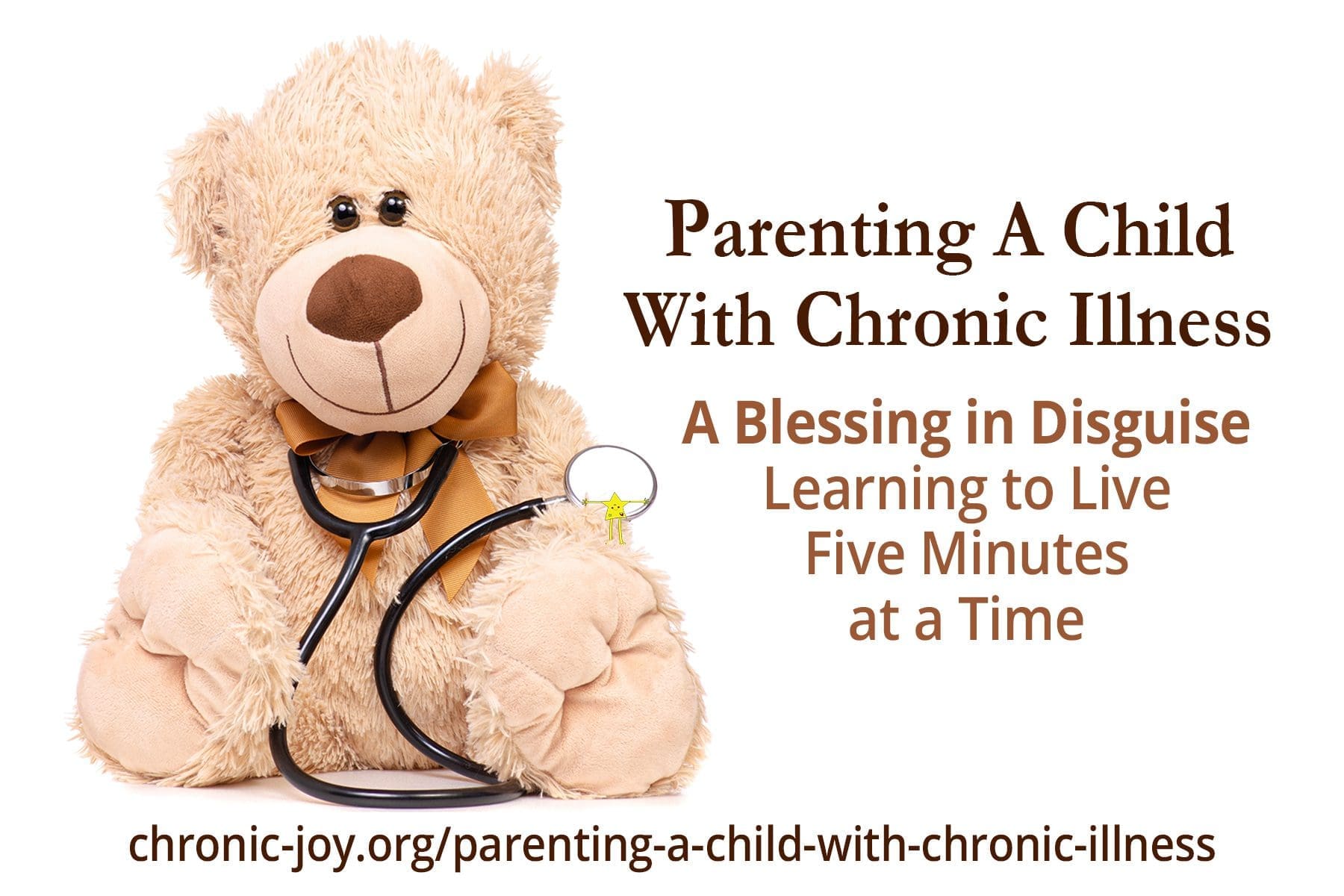Walking Through Your Child’s Chronic Illness with Hope
“Mom, my back hurts,” my 11-year-old Anna complained. “Did anything happen to cause the pain?” I asked. “No,” she said. Time went on and things seemed to be fine again. So I didn’t think twice about it — but then “My back hurts.” started to become a regular complaint. Initially, I thought it was probably just growing pains. Because of the frequency, I could no longer ignore it. It was time to see the doctor.
I will never forget the moment the urologist told us Anna needed surgery. Just thinking about it takes me back to the emotion-filled room with the doctor’s concerned look. “Anna has a blockage in her ureter causing chronic kidney pain,” he explained. Anna burst into tears, “I don’t want to have surgery.” I looked on helplessly as the tears began to spill from my eyes as well. This was going to be a hurt I couldn’t kiss and make better.
A LOST CHILDHOOD: CHILD’S CHRONIC ILLNESS
We were sent on to another surgeon at Children’s Hospital only to have it confirmed that surgery was indeed a necessity—and soon. What was supposed to be an easy procedure with a 98-percent success rate turned into an eleven-year nightmare. It was filled with complications, incredibly debilitating chronic pain, and more surgeries. Unfortunately, that was only the physical toll.
Emotionally, there have been years of depression, incredible grief due to school absences, loss of friends—and ultimately a lost childhood. While other kids were having fun and enjoying school activities and get-togethers, Anna was confined to her bed and couch. Inevitably, every time plans were made for day-to-day stuff including holidays, they were interrupted with excruciating pain and trips to the hospital for more surgeries and months of recovery.
TAG-TEAM PARENTING IN A CHILD’S CHRONIC ILLNESS
My husband and I were constantly playing tag-team parenting, one of us being home with Anna, while the other one carried on with the other girls. Medicine bottles overtook our kitchen counters. I grew to resent the heating pad that soothed Anna’s pain because it became a constant symbol that I had a sick child. A pit in my stomach arrived every time she requested it.
Trying to get her well became a part-time job. We did everything: trips to specialists in different parts of the country for second opinions, more surgeries (seven in all) and hours of research. Nothing brought the desperately hoped-and-prayed-for healing. Instead, it was one disappointment after another. I experienced an exhaustion level I had never before encountered and constant, excruciating, emotional pain as a mom. It was hard watching my child continually go downhill despite all of our best efforts to help her find health again.
A CHILD’S CHRONIC ILLNESS: EVERY LOOK BROKE ME
To say those years were taxing is an understatement. Most everything in our life was put on hold. Our world became smaller and smaller, evolving around a medical condition that not only left surgeons scratching their heads, but also began to overtake our lives. There were days, as Anna’s caregiver and advocate, that I didn’t think I could get out of bed to endure one more day looking into the face of my suffering child. On most days I had to will myself to do it. Every look broke me to the core. It was a deep pain that at times consumed me and taxed me to the point of despair. It was only as I learned to keep my eyes on God and His bigger plan that I found relief.
In his book, When Your Children Hurt, Dr. Charles Stanley said, “We can get up each morning and go on because we know that no matter how great the pain seems, He has a greater plan in mind for our sorrow. He promises to bring good out of even the worst circumstance. We must be willing to accept not only God’s healing and restoration, but also His sovereignty, because many times, healing may not take place on a physical level.”
TRIALS LIKE A CHILD’S CHRONIC ILLNESS TEACH US TO TURN TO GOD
Spiritually, there were times that I cried out to God, begging Him to do something — anything — to relieve this suffering. I even begged Him to make me the sick one, not Anna. Instead, He often felt far away and removed from our pain. It became a spiritual battle for me, wrestling with God and what I knew He was capable of when it comes to healing. Finally, I had to accept the reality that Anna might never get better. This might be as good as it gets, and God had His reasons. I prayed, “Lord, even if Anna never gets better, I will trust in Your plan.”
“There are heartaches and disappointments God allows that we do not fully understand – trials that teach us to turn to Him. He uses other people in the medical profession in a tremendous way to diagnose our diseases. but far too often we look to them to be our saviors who have all the answers we need to our medical problems,” Dr. Stanley said. “There must be a balance where we seek God’s wisdom and guidance along with the advice of the medical professionals He has given us. The moment we admit our weakness and need for Him, God begins to move on our behalf by opening doors of hope. This may include physical healing, or it may mean giving us the courage and support we need to keep going forward.”
A CHILD’S CHRONIC ILLNESS: WAYS TO WALK ALONGSIDE
This journey of our child’s chronic illness has been one of the most difficult challenges we have ever experienced as a family. Here are some things we have learned as we walked alongside a chronically-ill child. These are things to do as a caregiver to keep your sanity and trust God.
BE PRESENT IN THEIR PAIN.
Your child can make it through one more test, one more surgery, one more doctor’s visit; they can walk through the pain, deal with the side effects from meds, and the long recoveries as long as you’re by their side. It’s our presence that brings the most comfort and reassurance to our sick child. They need all of us in the family—even the dog!
We put Psalm 56:3, “When I am afraid, I will trust in you.” on an index card for Anna to take with her into every surgery along with her favorite blanket. This helped to remind her that the moment she leaves us and is rolled into surgery, she is not alone. Children need to be reminded often that God is always present with them and will never leave their side.
CELEBRATE THE GOOD DAYS AND SMALL IMPROVEMENTS.
Those celebrations can get you through the tough ones. Do something fun or just get out of the house. One summer, even though Anna wasn’t feeling 100 percent, we continued with our plans for a family vacation. Anna’s old self returned on that trip. Even though she still had to rest or just lay by the pool, it was important to change the scenery and focus on some fun. Karen Dockrey, an author and mom of a sick child, said, “Especially, if your child has a long-term illness, provide some normalcy in their lives… With a chronic illness, you can’t wait to enjoy life.” We had to learn to look for joy in between the doctors’ visits, heating pads, and procedures.
BE CAREFUL WHAT YOU PROMISE.
We can’t promise that our child’s chronic illness will get better, even though we want to. This can lead to false hope. What we can promise is that we and God will walk with them. And assure them we will do everything we can to get them the best medical care possible.
EXPECT EMOTIONAL CHALLENGES .
Don’t be surprised if depression hits you both. One of the staff from the pain management clinic told us early on that Anna probably wouldn’t begin processing what happened to her until her late teens and early 20s. That has been true. All of her energy and focus went into the physical issues she was dealing with. So, while her kidney problems finally ended at 20, her depression was just beginning.
FIND A PLACE TO POUR OUT YOUR SORROW.
This is hard stuff. You can’t always be strong. I had to find a circle of safe friends outside of my husband where I could be raw and real about my heart’s anguish and the challenges to my faith (You have to guard your marriage from becoming defined only by illness.).
Find a place to lament. Mine was in the shower where I let the water intermingle with my tears. You can’t carry all of the emotion and grief that comes with caring for someone who is chronically ill without finding a place to release it. I also walked most mornings; there God reminded me that He was bigger than my problems and in control even though I didn’t feel it or see it at times.
HELP YOUR CHILD EXPRESS THEIR PAIN.
I encouraged Anna to keep a journal and to do something as basic as draw a mad face or sad face for the day, a face for whatever she was feeling as a way to release her feelings. We also cried together often.
ACKNOWLEDGE THAT THIS IS TOUGH FOR BOTH OF YOU.
At times, it can feel like you’re not only losing your sanity, but you’re also losing your faith. God can handle our pain and anguish. We can be brutally honest with Him about how tough dealing with a child’s chronic illness really is. While this illness isn’t something you can thank God for, you can thank Him for the way He’s carrying you through it and that you are never alone. This will help keep your heart hopeful instead of sinking into despair.
God completely understands the pain of this journey of a child’s chronic illness because He knows firsthand what suffering is all about. Second Corinthians 4:8-9 reminds us, “We are hard pressed on every side, but not crushed; perplexed, but not in despair; persecuted, but not abandoned; struck down, but not destroyed.” We can put our trust in that truth especially when our feelings tell us otherwise.
PREPARE TO BE A PUNCHING BAG.
I’ve often been the recipient of Anna’s anger and grief. It can be a challenge when you are exhausted and doing everything possible to help your child get better. Don’t take it personally. Realize that for this season, you are the only safe place for your child to unload their pain. A child doesn’t have the ability to put language around their feelings. That’s where daily grace is needed as your child pours out their emotional pain, often lashing out at you.
WORK WITH THE SCHOOL.
This was one of the most stressful pieces for us during Anna’s illness. While most schools are unprepared to deal with a chronically ill student, you can arrange a meeting with the staff to map out a plan for best serving your child’s needs. Find at least one person who will be an advocate for your child, so you’re not running around to everyone. We also relied on a school social worker who came to the house to administer tests. Had we known Anna was going to miss three years of school, we would have done the online, virtual school to make things less stressful.
We have lived in the trenches of chronic illness for years. It’s become a way of life for our family. I realized that I could either resist it or welcome the things God was doing in each of us as a result. Thankfully, Anna is on her feet again and eventually graduated from college. She is the epitome of resilience and courage—and she’s my hero. In fact, I believe people walking day-by-day with the incredible challenges of chronic illness are some of the forgotten unsung heroes.
Chronic Illness Shapes Us
Looking at her, no one could ever imagine the huge battles she’s had to fight just to get out of bed every morning. Nor could anyone imagine the incredible energy it has taken to just go on with life. With relentless determination and will—prayer, and a support system of loving people—she’s done it. With every setback, she’s learned to take hold of her life again and again.
Chronic illness has shaped us all. And while Anna’s journey looks different from other kids’ her age, it is a journey God will not waste. Through it, He has given us all His heavenly kiss, making it better by drawing us closer to Himself. He is deepening our faith, not wasting the pain, and keeping our hope alive.
THREE WAYS FRIENDS AND FAMILY CAN HELP KEEP HOPE ALIVE:
1. Take the initiative and don’t forget the caregiver and family.
Families battling chronic health issues don’t have the energy to ask for help. Some friends showed up with plates of cookies, meals, and practical helps. I’ll never forget one friend who baked Christmas cookies for our family in a year where I could barely muster up the energy to put up a tree. My kids had homemade cookies because of her gesture of love—one of our traditions that was going to otherwise fall to the wayside. I had another friend who called and said she was picking me up for a movie. I didn’t want to go, but she told me when she’d be by. It was just what I needed, a brief time to be away from the pressure to think about something else — to feel normal again.
2. Have your kids reach out to their sick friend.
Sadly, Anna’s friends abandoned her. I remember calling her best friend’s mother after her first surgery to give her an update and invite them for a visit. I was not prepared for her response to not visit. It felt like one more thing that was slipping away from Anna’s normal life. Eventually that friend disappeared. Most people are not comfortable with pain, especially when it’s a child’s.
Certainly, kids at this age can’t understand a sick friend. This is where a parent can help. Help your child reach out by keeping in touch, sending a card, making a brief hospital visit, or regularly texting their friend. This can make a huge difference for healing on so many levels, especially emotionally. A child and family need to know that they are not forgotten.
3. Encourage for the long haul.
You need a support system willing to walk alongside you and your family for the long haul. Simple gestures—like regular texts or emails, cards, presence, helping with house cleaning, meals, or gardening—can mean so much.
*First published in Just Between Us magazine, Spring 2019. *Published with permission.


Shelly Esser
Editor of Just Between Us magazine
Shelly has been the editor of Just Between Us for more than 30 years. She has been involved with leading and nurturing women since her college days. Shelly and her husband live in Menomonee Falls, Wisconsin, and have four adult daughters and two sons-in-law.

Parenting a Child with Chronic Illness
A Blessing in Disguise! Parenting a child with chronic illness requires more strength, resolve, perseverance and courage than we likely ever dreamed possible, yet it also blesses us with the gifts of compassion, perspective, presence, and profound love as we are daily drawn closer to Christ.
LEARN MORE


Recent Comments